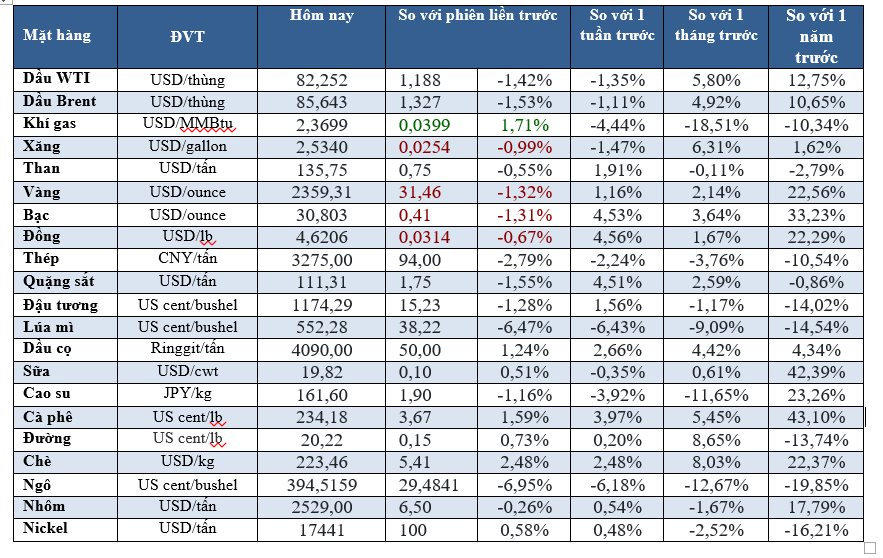
Illustration.
Oil falls on concerns Hurricane Beryl could hit US demand
Oil prices fell about 1% to a one-week low as Hurricane Beryl shut down U.S. refineries and ports along the Gulf of Mexico, and hopes of a possible ceasefire in Gaza eased worries about disruptions to global crude supplies.
Brent crude futures fell 79 cents, or 0.9%, to $85.75 a barrel, while U.S. West Texas Intermediate (WTI) crude fell 83 cents, or 1.0%, to $82.33 a barrel.
Hurricane Beryl lashed Texas with strong winds and heavy rain as it moved inland. Oil ports were closed, hundreds of flights were canceled and more than 2.7 million homes and businesses were without power.
In the Middle East, talks on a US-led ceasefire plan to end the nine-month war in Gaza are underway and are being brokered by Qatar and Egypt.
Elsewhere, investors are watching how elections in Britain, France and Iran over the past week will impact geopolitics and energy policy.
The French left says it wants to govern but admits negotiations will be difficult and take time, after Sunday’s election thwarted the far right’s quest for power.
In the US, President Joe Biden said he would not abandon his re-election campaign as he sought to stave off a possible revolt from Democrats who fear the party could lose the White House and Congress in the November 5 US election.
In Asia, crude oil imports fell in the first half of 2024 from a year earlier, largely due to lower arrivals to China, the world’s largest oil importer. In India, the world’s third-largest oil consumer, fuel consumption rose 2.6% year-on-year to 19.99 million tonnes in June from a year earlier. In Germany, exports fell more than expected in May due to weak demand from China, the United States and European countries. In Kazakhstan, the energy ministry said it would offset excess OPEC+ oil production in the first half of this year by September 2025.
The Organization of the Petroleum Exporting Countries (OPEC) and its allies, a group known as OPEC+, have largely extended oil production cuts through 2025. The production cuts have led analysts to forecast a supply deficit in the third quarter as shipping and air conditioning demand in the summer eats into fuel stocks.
Gold falls more than 1% as risk factors increase
Gold prices fell more than 1%, hurt by a risk-on rally in stocks and profit-taking by investors after a sharp rally in the previous session on expectations the US Federal Reserve could cut interest rates in September.
Spot gold fell 1.4% to $2,357.88 an ounce by 1804 GMT, after rising to its highest since May 22, 2024. U.S. gold futures fell 1.4% to $2,363.50.
Data last week pointed to a sluggish labor market, prompting the U.S. central bank to start cutting interest rates sooner. Markets are now pricing in a 71% chance of a Fed rate cut in September and another cut in December.
Spot silver fell 1.7% to $30.68 an ounce, platinum fell 2.4% to $1,001.75 and palladium fell 1.5% to $1,010.87.
Copper falls as dollar weakens, demand slows in China
Copper prices fell as the dollar weakened on signs of persistently weak demand from China.
Three-month copper on the London Metal Exchange fell 0.2% to $9,920 a tonne by 1610 GMT after hitting a three-week high on Friday. LME copper has fallen about 11% since hitting a record high of $11,104.50 in May.
US Comex copper futures fell 0.7% to $4.62/lb.
Investors are hoping that additional stimulus measures will be announced at China’s key third plenary meeting on July 15-18.
Lackluster demand in China has led to a buildup of inventories, with deliverable inventories in warehouses not far from a four-year high hit last month.
A survey by the Shanghai Metal Market showed an unexpected drop in operating rates at copper cable and wire makers last week.
The most-traded August copper contract on the Shanghai Futures Exchange fell 0.3 percent to 79,930 yuan ($10,995.25) a tonne.
The dollar slipped after data on Friday showed U.S. job growth slowed slightly in June while the unemployment rate rose, fueling bets that the Federal Reserve could start cutting interest rates in September.
On the LME, aluminium rose 0.2% to $2,530 a tonne and zinc fell 1.5% to $2,955.50. Lead was little changed at $2,236, nickel rose 0.6% to $17,440 and tin rose 0.7% to $34,125.
Iron ore falls on demand concerns, high inventories
Iron ore futures fell as weak demand and high inventories in China weighed on steel prices.
The September iron ore contract on China’s Dalian Commodity Exchange (DCE) closed down 3.3% at 825.50 yuan ($113.56) a tonne. The August benchmark iron ore on the Singapore Exchange was 1.8% lower at $108.40 a tonne.
The decline came after a weekly gain, supported by dovish comments from the US Federal Reserve (Fed) and investors’ hopes of additional measures to boost China’s economy from a key meeting on July 15-18.
However, the actual supply and demand situation has not improved and therefore the higher prices touched last week will be difficult to maintain. Buying power is now weaker from steel mills, port inventories are increasing.
Inventories at major ports in China rose to 150 million tonnes as of last Friday, 25% higher than at the beginning of the year and 18% higher than the same time a year earlier, data from information provider Mysteel showed.
On the Shanghai Futures Exchange, steel prices trended down. Rebar fell 2.3%, hot-rolled coil fell 1.9%, steel bars fell 2.3%, while stainless steel was stable.
Soybeans, corn, wheat fall on hopes of positive US crop report
Chicago soybean and corn futures fell to their lowest levels in four years as traders awaited a report on U.S. crop progress from the U.S. Department of Agriculture (USDA). Traders expect crops to be damaged by recent hail, heavy rains and extreme flooding across parts of the western Corn Belt.
July and September corn futures both fell below the psychological level of $4 a bushel, while the most active soybean contract fell to its lowest price since November 2020. Wheat futures also turned sharply lower, amid market expectations that recent hot and dry weather will allow the U.S. harvest to progress well.
Wheat futures also fell sharply on expectations that recent hot, dry weather will allow the U.S. harvest to progress. Chicago wheat fell 20 cents to $5.70-1/2 a bushel. Corn ended the session down 16-1/4 cents to $4.07-3/4 a bushel and soybeans fell 30-1/4 cents to $10.99-1/2 a bushel.
Coffee prices rise sharply due to tight supply
Robusta and arabica coffee futures on ICE rose sharply, weighed down by tight supplies due to slow exports from Vietnam and weather problems, while cocoa prices ended lower.
Robusta coffee futures for September delivery rose $163, or 3.9%, to $4,348 a tonne.
Dealers said the pace of exports from Vietnam remains slow, with supplies expected to remain tight until the next harvest picks up in November. Indonesia’s robusta harvest is slowly starting to pick up, with a significant improvement expected compared to last season.
September arabica coffee futures rose 2.4% to $2.344/lb.
Weather remains supportive for coffee, with below average rainfall in both Vietnam and Brazil.
September London cocoa futures fell 154 pounds, or 2.4%, to $6,394 a tonne, in a lacklustre session that saw prices rise more than 3% earlier. September New York cocoa futures fell 1.8% to $7,705 a tonne.
Lightening Road
October raw sugar futures were little changed at 20.13 cents a lb. August white sugar futures fell 2.5% to $560.70 a tonne.
Dealers said rains are expected in some areas of south-central Brazil in the next few days, which could ease concerns about cane conditions in those areas.
Brazil’s oil company Petrobras announced a 7% increase in gasoline prices. The move could boost domestic ethanol profits and reduce the sugar price advantage.
Japanese rubber hits 8-week low on stronger yen
Japanese rubber futures fell to their lowest in nearly eight weeks, as a stronger yen and weaker rubber prices in top producer Thailand weighed on sentiment.
The December rubber contract closed down 7 yen, or 2.16 percent, at 317.1 yen ($1.97) a kilogram. The September rubber contract on the Shanghai Futures Exchange closed down 115 yuan, or 0.78 percent, at 14,610 yuan ($2,009.77) a tonne. Thailand’s benchmark export smoked rubber (RSS3) fell 2.39 percent to 70.75 baht ($1.94), while block rubber fell 2.81 percent to 63 baht on Monday.
The August rubber contract on the Singapore Exchange last traded at 162.1 US cents/kg, down 0.9%.
Prices of some key commodities on the morning of July 9, 2024

